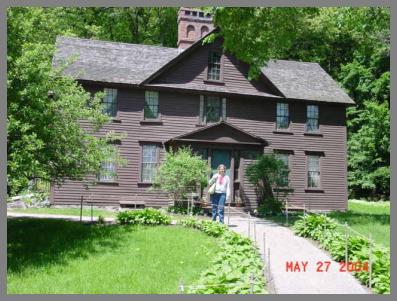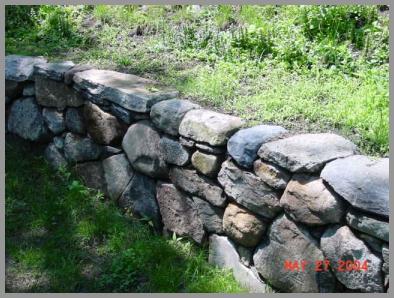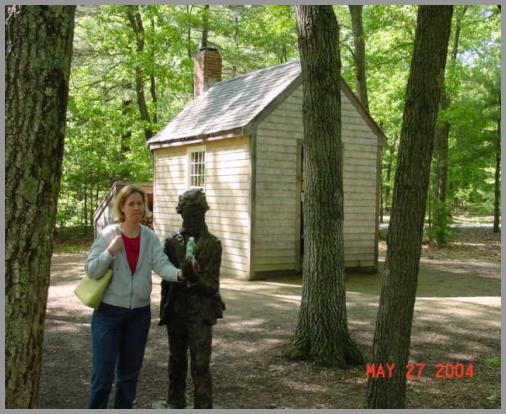
We visited the home turf of Thoreau and Emerson in Concord, MA. Actually, we spent a lot more time with Louisa May Alcott, who wrote “Little Women”. They all lived near each other and interacted on a regular basis.
“Little Women” was Chrissy’s favorite book when she was a girl. I suppose there are men who have read it voluntarily, but we were not the target audience. I did enjoy touring the house, however. Louisa’s father was named Bronson. He was an interesting guy who came from extreme poverty. His father was probably illiterate, but Bronson taught himself. I never knew anything about him, but evidently he influenced many people besides his famous daughter. Emerson’s essay on the American scholar is supposed to have been based on him. In his house was educated a local artist who went on to sculpt the statue of Lincoln in the Lincoln memorial. Thoreau was a frequent guest. All that said, the man was obviously weird and probably hard to live with. He didn’t support his family well, and they were always poor until Louisa May made big money from “Little Women” and her subsequent writings.
Louisa May never married. According to the guide, her mother and father had different personalities. I think that is docent code for family conflict. That, and her father’s remarkable inability to earn a decent living for his family, may have soured her on the opposite sex. If a movie were made about Louisa May Alcott as an adult, Glen Close would certainly play her. I am not fond of Glen Close, but you have to give Louisa May Alcott credit. She supported her whole family, on to the third generation, with the money she earned and never seems to have complained about anything. She traced and paid all her father’s debts, which were many, sent her high-strung little sister to art school in Europe and paid for the family house, which we visited.
The Alcott house was built first in the 1600s and later extended and improved. It is a pleasant place, but the ceilings are very low and the floors badly warped. In fact, the place is crumbling. Powder beetles, which have a diet a lot like termites, have eaten most of the supporting pillars. Besides that, Bronson put some of the house on the dirt – no foundation. Direct contact with wet earth is not good for wooden structures. I guess the house lasted long enough for his purposes. The place is being restored by some society created specifically to do that, probably consisting mostly of earnest old ladies with a lot of money. I have no doubt they will succeed.
I enjoy such houses because of the personal insight you get into the people’s lives. In the Alcott case, I was impressed on how contemporary the family seemed. Sure, they did a lot of things we no longer do, but they had similar problems, hopes and dreams. As I wrote, Bronson was weird. He imposed tasks on his family and made them all vegetarians. From all indications, however, they didn’t really listen to him. It sounds a lot like a modern sitcom, maybe Frazier with five kids. Bronson also dreamed big. He built “The Concord School of Philosophy” next to his house. It is sort of a fancy barn with a big lecture hall. It is unheated, so classes were held only in summer. His faculty consisted of himself, but he printed up programs and managed to get most of the famous people who passed through Boston to come out and give lectures. A freelance university – you just couldn’t do anything like that today, but it is easier to start a dot com.
The picture below is one of the fine New England stone walls behind the Alcott place.

Walden
After the Alcott place, we visited Walden Pond, where HD Thoreau wrote the famous journal about his life in the wilderness. It is not wilderness now, and it was even less wilderness then, when the area was heavily farmed. You can walk from Concord to Walden in about a half hour and there were always people around even in Thoreau’s time. Thoreau was kind of going out to live in the local park. I am sure he was a local curiosity – strange old Henry living next to the lake. It is as if I found a guy along one of my running trails who thought he was living in the wilderness because there were a few big trees and a couple of fierce chipmunks prowling nearby. If Thoreau was really looking for wilderness, he could have easily found it in 19th century America. The truth is that Thoreau didn’t like wilderness, at least how we would use the term today. The one recorded time he came in contact with the real thing was during a visit to the State of Maine, when he complained that it was too lonely up there. His quest for the simple life was obviously a hobby. But like Bronson Alcott, he dreamed big and left a lasting mark.
Walden pond is bigger than I thought it would be, even if not so big. I bet I could swim across it. Chrissy doubts my bold claim. In fact, some people were swimming, although they were wearing wet suits. Didn’t look that hard. Where we saw the lake, there was a beach with sand brought in from somewhere else. These little mud-bottomed lakes don’t naturally have sandy beaches. It reminded me a lot of Lake Harriet in Minneapolis. Bunches of teenagers were loitering around. I bet the place gets even more popular with them when the sun goes down.
Thoreau’s Wilderness
I listened to a lecture by a forester from the University of Massachusetts called “Thoreau’s Country”. He pointed out the Massachusetts looked much less like wilderness in Thoreau’s time than it does today. In those days, farming was inefficient (although organic) and a lot more acreage had to be under the plow or in pasture. It leads to an interesting dilemma for preservationists. What do we preserve? If we leave the land alone, it will quickly be covered with forest, but heavy forest is not the landscape that Thoreau, Emerson or Alcott would recognize. Of course, farming with the old methods is not economical and the upscale local communities would object to the pungent presence of pigs, horses and cows needed to keep the fields from becoming forests. (Maybe horses would be okay. Upscale people like horses. Grazing horses are picturesque; running horses are graceful, but cows are a stretch, especially on the graceful running, and pigs have none of these redeeming characteristics.) He guy also said that modern people don’t really understand where their resources come from. In Thoreau’s day, people knew some of the local trees were for fuel or furniture and today’s pig was tomorrow’s pork. When food and fuel comes from far away, people can delude themselves about nature being a big park full of benign creatures that are to be seen but not touched.

Thoreau’s Tool Shed
Back to our trip. We saw a reproduction of Thoreau’s cabin. The real thing has long since become compost. That is Chrissy with Thoreau’s ghost in the picture in front of his cabin. He really craved Coca-Cola, but water was all we had. Thoreau’s place was much like a shed for the lawnmower.
